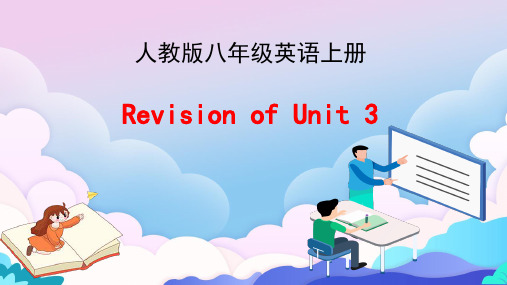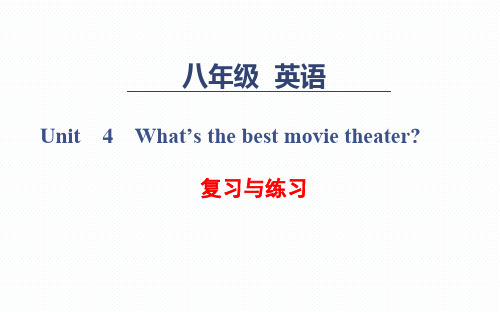人教版八年级上册英语复习PPT课件
合集下载
人教版八年级英语上册复习课件Unit 10 If you go to the party, you will have a great time(24张PPT)

例句:If people obey the traffic rules, there will be fewer accidents.
3、时态:
if引导的条件状语从句,主句用一般将来时(will),从 句用一般现在时表将来。
If引导的条件状语从句,主句是情态动词如: must,can,could,should等,从句用一般现在时 例句:如果交通指示灯是红的,你必须停下来等一等。 eg:If the traffic lights are red,you must stop and wait.
(1)Ask sb. (not) To do sth.
Our teacher asks us to read every day. (2)too…to…意为“太……而不能……”too后加形容词或副词,to 后加动词原形。
This question is too difficult for me to answer. Too…to…可以与not…enough to do sth.及so…that…进行转换
Tom’s sister is afraid of dogs.
考点讲解:
12、If I tell my parents, they’ll be angry. Angry形容词,意为“发怒的,生气的” Be angry with sb. 生某人的气
If you don’t finish the work, Mr Green will be angry with you. Be angry at/about sth. 因某事而生气
• 注意事项
• 1. 在if引导的条件状语从句中,当主句是一般将来 时时,不能够使用be going to结构,而要用will。
期末总复习课件(共47张PPT) 人教版英语八年级上册.ppt

例如:He likes apples.他喜欢苹果。 ( 主语是He, likes 是动词第三人称单数形式)
一般现在时的关键词:always,(总是),often(经常), usually (通常), never从未;every day每天, every week每周, every year每年, sometimes有时候, at times时常。
A.as better as B.as good as √C.as well as
( )8.The programs on Channel 10 are ____better than Channel 5.
A.more
√B.much
C.many
( )9.He is _____than any other students in his class.
A.cold B√.colder
C.coldest
( )14.Which city is______,Bei jing,Shang hai or Liuzhou?A.bigB.bigger
√C.the biggest
模块5和6:动词不定式 (1)、(2)和双宾语。 1.动词不定式(带to的动词):to+动词原形(注:to do代表不定式) 例如:She wants to see her aunt.她想去看望她的阿姨。
( )4.I______ my homework when my mother came home.
A.am doing √B.was doing C.did ( )5.She often ______ shopping with her mother.
A√.goes B.go C.went ( )6.We_____swimming tomorrow afternoon.
一般现在时的关键词:always,(总是),often(经常), usually (通常), never从未;every day每天, every week每周, every year每年, sometimes有时候, at times时常。
A.as better as B.as good as √C.as well as
( )8.The programs on Channel 10 are ____better than Channel 5.
A.more
√B.much
C.many
( )9.He is _____than any other students in his class.
A.cold B√.colder
C.coldest
( )14.Which city is______,Bei jing,Shang hai or Liuzhou?A.bigB.bigger
√C.the biggest
模块5和6:动词不定式 (1)、(2)和双宾语。 1.动词不定式(带to的动词):to+动词原形(注:to do代表不定式) 例如:She wants to see her aunt.她想去看望她的阿姨。
( )4.I______ my homework when my mother came home.
A.am doing √B.was doing C.did ( )5.She often ______ shopping with her mother.
A√.goes B.go C.went ( )6.We_____swimming tomorrow afternoon.
人教版八年级上册Unit1知识点复习课件(共43张PPT)

SectionB
enjoyable adj. 有乐趣的 <2a>
Eg. Swimming is one of the most enjoyable
activities. enjoy+n./代/Ving v.喜欢/享受 enjoy oneself 玩的开心 enjoy my weekend 享受我的周末 enjoy learning English 享受(喜欢)学习英语 常接Ving作宾语的动词/动词短语:
visitor n. 游客
3. Grammar Focus 复合不定代词
1. 作主语时 谓语动词用单数
Eg.Everyone is happy. 2.被定语修饰时(形容词/动词不定式/else 等) 定语后置.
Eg.I like nothing old, but friends.
Eg.Would you like something else? 3.some类用在肯定句,any类用在否定句/ 疑问句在表示请求/提议等希望得到对方 肯定答复的问句中用some不用any
Eg. He has good taste in clothes.
look feel sound smell taste
anything
anyone
everything
something
anything anything
nothing
11. of course "当然" <3a> =sure/certainly of course not-当然不 Eg. --- Would you mind closing the window?
Eg. They were on vacation last
人教版八年级英语上册Unit3复习课件(共30张PPT)

14.感动某人
touch one’s heart
15.小声地说 speak quietly
16.大声地唱 sing loudly
17.跑得更快 run faster
18.跳得更高 jump higher
19.摔伤我的胳膊 break my arm
20.起床更早 get up earlier
21.最重要的事情 the most important thing 22.想赢
Write down as many description words as possible.
appearance
7.只要,既然 as long as
8.与...不同
be different from
9.使显现,使表现出 bring out
10.与...类似的 be similar to
11.确切地说,实际上 in fact
12.在...方面有天赋 be talented in
13.和...相同
the same as
9.adj.大声的;响亮的___lo_u_d_____→adv.大声地____lo_u_d_l_y__ 10. adj.真正的___tr_u_e_____→adv.真正;确实____tr_u_ly____ 11. v.(使)破;裂;碎;损坏___b_r_e_a_k___→(过去式)____b_r_o_k_e__ 12. n.朋友_f_ri_e_n_d_____→adj.友好的____f_ri_e_n_d_ly_ 13.n.才华__t_a_le_n_t____→adj.有才能的;有才干的___t_a_le_n_t_e_d_ 14. adj.严肃的;稳重的___s_e_ri_o_u_s__→(比较级)___m__o_r _s_e_ri_ous 15.v.在意;担忧;关心__c_a_re______ →adj.小心的___c_a_re_f_u_l __
人教版八年级英语上册-全册PPT课件全集(149张)

26) more than 多于
课文要点
1、What do you usually do on weekends?
on weekens 表示“在周末”,泛指每个周末; on the weekend表示“在周末,在这个周 末”,特指某个周末。
2、help with housework
help sb. with sth. = help sb. (to) do sth
初二英语上册
Unit 1: Where did you go on vacation?
New Words.
anyone wonderful something seem someone try different umbrella hungry dislike anywhere most everyone bored dicide wonder wait enough
修饰不可数名词,意为 “太多”,还可修饰动词 做状语
修饰形容词或副词,意为 “太”
She bought too many eggs. We have too much work to do.
You are walking much too fast.
too much, much too,用法区别看后头,much后接不可数, too后修饰形或副。Too many 要记住,后面名词必复数。
1)单数名词词尾加’s, 复数名词词尾没有s, 也要加 ’s the girl’s pen Children’s Day
2)复数名词以s结尾的只加 ’ the students’ reading room
3)如果两个名词并列,并且分别有 ’s, 则表示“分别有”; 只 有一个名词有一个’s, 则表示“共有”;
Units 3-4 复习课件(共25张PPT)人教版八年级英语上册

6.The_s_a_y_i_n_g__s_(格言) are very important to me. 7.his journey was _f_a_n__t_a_s_t_i(c 极好的)and exciting. 8.Mo Yan is the Noble_P__r_i_z_e_(奖) w__i_n__n_e_r____(获胜者) 9.He is _s_e__r_i_o_u_s_(严肃的) , he takes everything _s__e_r_i_o_u_s_l_y(认真地). 10.For us all ,Lei Feng is the _e_x_a_m___p_l_e(实例,范例) of learning.
(n.) 15.choose(v.选择) — c_h_o_ic_e_ (n.) —__c_h_o_se (过去式\过去分词) — cho_s_e_n__ 16.friendly _m__o_re_f_ri_e_n_d_ly_\f_ri_e_nd_l_ie_r(比较级) __m__o_st__fr_ie_n_d_ly_\_fr_ie_n_d_li_es_t_-(最
1.有天赋的 talented 2.魔术师 magician
3.大声地 loudly 4.安静地 quietly
5.清晰地 clearly
6.真正 truly
7.有必要的 necessary
8.舒适的 9便宜地 10.小心地 11赢 12.谚语
uncomfortable cheaply carefully
1.quiet(adj.安静的)— _q_u_i_et_ly__(adv.) 2.clear (adj. 清楚的)-__c_l_e_a_r_ly__(adv.) 3.true(adj.真的)— _t_ru_l_y_ ( adv. )4.cheap(adj.便宜的)— _c_h_e_a_p(ly adv. ) 5.careful(adj.小心的)—_c_a_re_f_u_lly ( adv. )6.beautiful(adj.漂亮的)—b_e_a_u_ti_fu(llyadv.) 7.serious(adj.严Байду номын сангаас的,认真的,严重的) — _s_e_r_io_u_s_l_y__ adv. ) 8. comfortable(adj.舒服的)— c_o_m__fo_r_ta_b_ly_( adv.)(adj. 反)— u_n_c_o_m_fortable 9.crowd(v.拥挤)_c_ro_w__d(edadj.)(adj.反) — _u_n_c_ro_wded pete(v.竞争)—_c_o_m_p_e_t_it_o(r n.竞争者)—(n.竞争)_c_o_m_p_e_t_it_io_n___ 11.win(v.获胜 ) — _w_i_n_ne_r (n.获胜者) 12.talent(n.天赋) — __ta_l_e_n_te_d___ (adj.) 13.say(v.说)— _s_a_y_in(g n.谚语)14.create(v.创造) —c_re_a_ti_v(e adj.) — _c_r_ea_t_ivity
(n.) 15.choose(v.选择) — c_h_o_ic_e_ (n.) —__c_h_o_se (过去式\过去分词) — cho_s_e_n__ 16.friendly _m__o_re_f_ri_e_n_d_ly_\f_ri_e_nd_l_ie_r(比较级) __m__o_st__fr_ie_n_d_ly_\_fr_ie_n_d_li_es_t_-(最
1.有天赋的 talented 2.魔术师 magician
3.大声地 loudly 4.安静地 quietly
5.清晰地 clearly
6.真正 truly
7.有必要的 necessary
8.舒适的 9便宜地 10.小心地 11赢 12.谚语
uncomfortable cheaply carefully
1.quiet(adj.安静的)— _q_u_i_et_ly__(adv.) 2.clear (adj. 清楚的)-__c_l_e_a_r_ly__(adv.) 3.true(adj.真的)— _t_ru_l_y_ ( adv. )4.cheap(adj.便宜的)— _c_h_e_a_p(ly adv. ) 5.careful(adj.小心的)—_c_a_re_f_u_lly ( adv. )6.beautiful(adj.漂亮的)—b_e_a_u_ti_fu(llyadv.) 7.serious(adj.严Байду номын сангаас的,认真的,严重的) — _s_e_r_io_u_s_l_y__ adv. ) 8. comfortable(adj.舒服的)— c_o_m__fo_r_ta_b_ly_( adv.)(adj. 反)— u_n_c_o_m_fortable 9.crowd(v.拥挤)_c_ro_w__d(edadj.)(adj.反) — _u_n_c_ro_wded pete(v.竞争)—_c_o_m_p_e_t_it_o(r n.竞争者)—(n.竞争)_c_o_m_p_e_t_it_io_n___ 11.win(v.获胜 ) — _w_i_n_ne_r (n.获胜者) 12.talent(n.天赋) — __ta_l_e_n_te_d___ (adj.) 13.say(v.说)— _s_a_y_in(g n.谚语)14.create(v.创造) —c_re_a_ti_v(e adj.) — _c_r_ea_t_ivity
人教版八年级上册英语第一第二单元复习课件(共51张PPT)

•
drive-drove-driven rise-rose-risen ride-rode-ridden
•
write-wrote-written give-gave-given
•
③其他
中考演练
28. The mobile phone has influenced people’s life a lot since it .(13年中考)
Something is wrong with my watch.
Everyone wants to win.
Nobody knows the boy’s name.
There is something for everyone at Green Park.
中考演练
( B)May I have a talk with you ,sir? (2011陕 西21题)
Revision
为某人买某物 当然 似乎做某事 没事可做除了… 去购物 为考试做准备 大部分的时间 我很无聊
buy sth for sb/ buy sb sth
of course seem to do nothing to do but do… go shopping study for tests most of the time
C. new something D. new anything
(A) 2 I will do____for my motherland. (15原创
A anything B. many C. much D. something
中考热点四
too many +可数名词复数 too much +不可数名词 much too +形容词或副词
人教版八年级英语上册Unit 4复习课(共44张PPT)

根据汉语完成句子 5. 这家商店经常播放最舒服的音乐。 This shop often plays the most comfortable music. 6.在这家超市你能够买到最新鲜的蔬菜和水果。 You can buy the freshest vegetables and fruit in this supermarket. 7.哪家电台播放最无聊的歌曲? Which radio station plays the most boring songs? 8.它有最大的座位,坐着最舒服。 It has the biggest seats and you can sit the most comfortably.
▲主语+谓语+最高级+比较范围 ▲比较范围二:in+地点 1. The radio station has the worst (bad) music in the city. 2. Does Gold Theatre have the most comfortable (comfort) seats of the five in your city? 3. Miss Zhao is the most popular (popular) teacher in our school. 4. I think Sunny Cinema is the best (good) cinema in town because it has the most comfortable (comfortable) seats and the biggest (big) screens. 5. He is the quietest (quiet) boy in my class. He almost never talks. 6. Henry sings best (well) in our class.
- 1、下载文档前请自行甄别文档内容的完整性,平台不提供额外的编辑、内容补充、找答案等附加服务。
- 2、"仅部分预览"的文档,不可在线预览部分如存在完整性等问题,可反馈申请退款(可完整预览的文档不适用该条件!)。
- 3、如文档侵犯您的权益,请联系客服反馈,我们会尽快为您处理(人工客服工作时间:9:00-18:30)。
do(does或did) 是起帮助构成疑问的
作用)与一般现在时或一般过去时
连用,回答一般是用表示频率的副词,如:once, twice, three times…,
sometimes, often, quite, often, never,
every day, once a week , twice a
29.尽量做某事
try to do sth
• try to do sth
.
4
【应掌握的句子】
1.
How often do you exercise?
你(你们)多久锻炼一次身体?
How often + 助动词do(does或did) +
主语 + do sth.? 疑问词how often是
问频率(多久一次),(在这里助动词
• 18. shop=go shopping=do some shopping
• 购物
• 19. as for
• . 至于
3
• 20. activity survey
• 活动调查 • 21.做家庭作业 • do homework • 22.做家务事 • do house work • 23.吃更少的肉 • eat less meat • 24.垃圾食物 • junk food • 25.对什么有益 • be good for • 26.对什么有害 • be bad for • 27. 想做某事 • want to do sth • 28.想某人做某事 • want sb to do sth
• 7. exercise=take(much)exercise=do sports
• 锻炼
• 14. make a difference to • 对什么有影响
• 15. how often
• 多久一次 • 16. although = though • 虽然 • 17. most of the students=most students
.
2
• 8. eating habits
•
1. go to the movies
【应掌握• 的饮食词习惯组】 • 9. take more exercise • 做更多的运动
• 去看电影 • 2. look after = take care of 照顾 • 3. surf the internet • 上网 • 4. healthy lifestyle • 健康的生活方式
.
5
• 2. “What do you usually do on weekends?” “ I usually play soccer.”
• “周末你通常做什么?”“我通常踢足球。” • 第一个do为助动词, 在这起帮助构成疑问的作用;而
第二个do则是实义动词。 • 翻译: What do you usually do on weekends? I often go
八年级英语
暑期补课教程
.
1
Unit 1: How often do you exercise?
• 【复习目标】 • 会使用频率副词及短语; • 能描述课余时间的活动安排; • 会描述基本饮食结构。 • 【语言目标】
• ● What do you usually do on weekends?
• I sometimes go to the beach. • ● How often do you eat vegetables? • Every day. • ● Most students do homework every day. •
【重点词汇】 • ● always, usually , often, sometimes , hardly , ever, never. • ● how often, once , twice , three times a week , every day. • ● milk, junk food, health, unhealthy, habit, exercise, most, result, try, different • maybe, although, arm, foot, tooth, ear, eye, advice, thirsty ,forget, finish, plan .
• 5. go skate boarding
• 10. the same as • 与什么相同 • 11. be different from • 不同 • 12. once a month • 一月一次 • 13. twice a week • 一周两次
• 去划板
• 6. keep healthy=stay healthy • 保持健康
month , three times a month , three
or four times a month 等。
• 1. How often do you exercise? • 你(你们)多久锻炼一次身体? • How often + 助动词do(does或did)
+ 主语 + do sth.? 疑问词how often 是问频率(多久一次),(在这里助 动词do(does或did) 是起帮助构成 疑问的作用)与一般现在时或一 般过去时连用,回答一般是用表 示频率的副词,如:once, twice, three times…, sometimes, often, quite, often, never, every day, once a week , twice a month , three times a month , three or four times a month 等。
• 29.尽量做某事
20. activity survey 活动调查 21.做家庭作业 do homework 22.做家务事 do house work 23.吃更少的肉 eat less meat 24.垃圾食物 junk food 25.对什么有益 be good for 26.对什么有害 be bad for 27. 想做某事 want to do sth 28.想某人做某事 want sb to do sth
